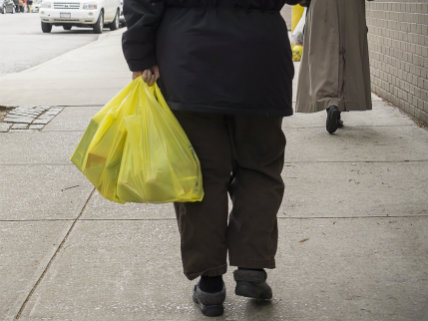Chicago's New Bag Tax Will Generate $13 Million, Won't Save Environment
So, it's working as planned.

A new tax on paper and plastic bags in Chicago will generate an estimated $12.9 million annually for the city's coffers but is unlikely to reduce the number of bags used by Chicagoans.
The 7 cent per bag tax was included in the new city budget approved on Nov. 16 and will go into effect on Jan. 1, but analysts say the fee is probably too low to change the behavior of Chicago residents or businesses. After the tax is collected, most of the revenue will flow directly to the city's budget and will not be used for environmental restoration or pollution clean-up—as is the case in other places where similar taxes have been imposed for supposedly environmental reasons.
The city will get 5 cents of the tax from every bag, while retailers will be allowed to keep the other 2 pennies per bag. An analysis by the Better Government Association, an Illinois-based civil action organization, found that retailers could pocket as much as $3.7 million next year because of the tax.
While the city and retailers will be able to get more money from shoppers, the bag tax probably won't do much to change behavior.
"The Chicago tax, which will apply to paper as well as plastic, is far lower than the 30-cent a bag charge that successfully curbed behavior in Ireland, raising questions about whether shoppers at grocery and retail outlets will view it more as an annoying trifle than a penalty to actively avoid," the Better Government Association concludes.
Bag taxes seem to split progressives between two camps: those who believe the taxes are worth it (necessary, even) to stop pollution and nudge shoppers towards reusable bags, and those who see the taxes as regressive and bad for the poor.
Both perspectives miss the reality of what has happened in places with taxes similar to what has passed in Chicago.
A 2015 audit of a 5 cent per bag tax in Washington, D.C., found that it did little to change consumers' behavior. Of the $10 million generated over the first five years that the tax was in place, most of it was used to pay for city workers and to cover the cost of field trips for school students, not for the environmental repair work promised by advocates of the tax.
In other places, taxes have created a temporary decline in bag usage. John Halstead, professor of environmental and resource economics at the University of New Hampshire, told the Chicago Tribune that convenience ultimately wins out as consumers rationalize paying a few extra pennies for their bags. "Basically there was one year of decreased bag usage and then people just opted to pay the fee," Halstead said.
The real reason taxes like this are enacted is to pad government budgets. Chicago already has a similarly surreptitious tax on bottled water (also passed in the name of being green). If you prefer to get you water from the tap, you'll pay a tax on that too—in August, the city instituted a new tax on water and sewage in order to plug a massive public pension deficit.


Show Comments (28)